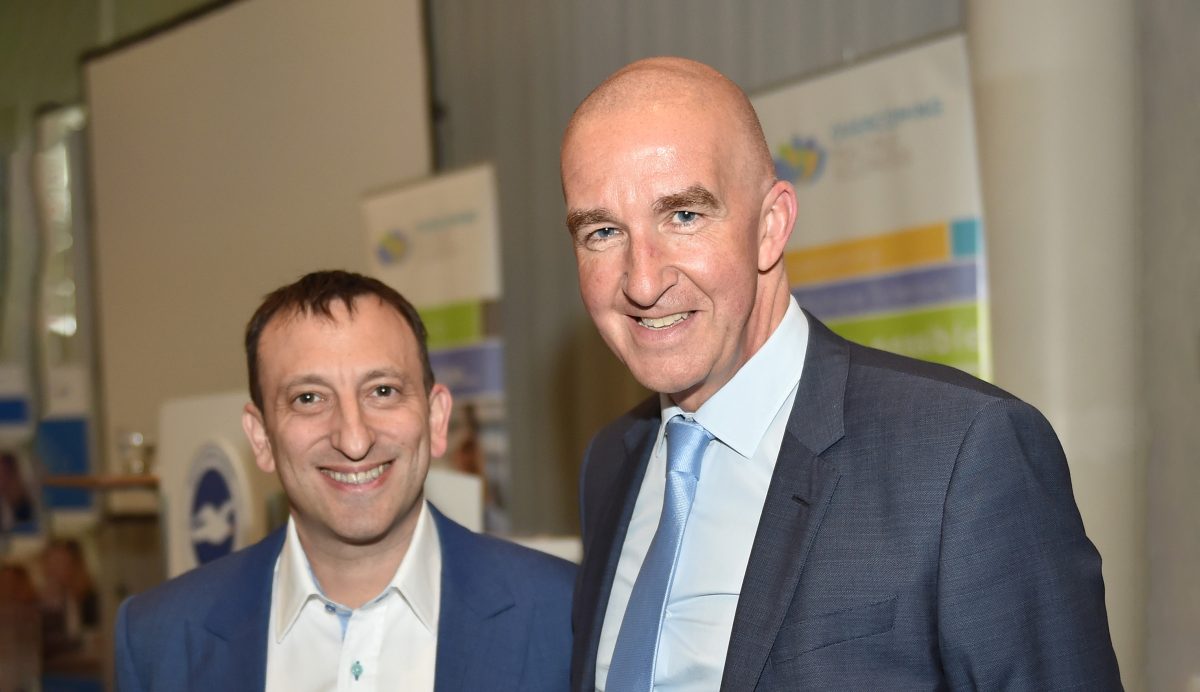After a break of four years, the Overcoming Multiple Sclerosis (OMS) lunch is back on the menu at The Amex on Thursday November 2.
Brighton football club owner Tony Bloom will be doing a Q+A with lunch organiser and Sussex businessman, Tim Cobb. OMS chief executive Alex Holden will explain about the great work that the charity is doing to support people with MS.
An amazing 17 tables have already been sold and Tim hopes to welcome more than 200 people to the event.
Tim has linked up with the county’s three key networking groups to further promote the event. County Business Clubs, Network My Club and Best of British have all agreed to start marketing the event.
Handelsbanken has come forward as the first sponsor, and three more categories are up for grabs. Sponsors will get a name-check in all promotional literature, a front-row table and a chance to chat to, and have photos with, Tony Bloom.
The football club is also throwing its weight behind the lunch by promoting the event to fans.
If you are interested in attending the lunch, priced £80per person, please click here
Running Order
- 12 noon: Mayo Wynne Baxter lounge for welcome drink
- 12.20: Take seats
- 12.30: Tim to welcome guests
- 12.35: Heads & Tails game
- 12.45: Overcoming MS chief executive explains the work of the charity
- 1pm: Two course lunch
- 2.45pm: Auction
- 3.15pm: Q+A with Tony Bloom
- 3.45pm: End of formal event
- 5pm: Bars close
Tim’s story
Tim Cobb was a bit of a fitness nut. He ran with his dog every day, had completed a handful of marathons and went to the gym three times a week. So when he nipped in for a sports physio appointment to sort out a sore back, he was stunned when the healthcare guy said he probably had Multiple Sclerosis (MS).
An online search filled in the blanks in his knowledge – MS was a degenerative, debilitating, incurable disease that would probably knock 10 years off his life and probably see him ending his years in a wheel-chair.
Tim went in to denial. He didn’t talk about it and certainly did not want to tell his three teenage sons. His wife Sue was his rock during a rather bleak time. It was Sue who came across an organisation called Overcoming MS and bought him a book about how a doctor in Australia suggested that MS was not that bad and was manageable.
The doctor suggested a radical change of diet, a change of lifestyle, taking up meditation and yoga. Tim was not ready for this and continued with the same routine of hiding from reality and not talking about his diagnosis. MS continued its destructive path. Tim suffered numbness in different parts of his body, stiffness around knee joints and a loss of peripheral vision. He was forced to stop driving for a period of time.
Through a series of strange coincidences, Tim once again found himself looking at the OMS approach as a way of tackling his condition. Sue encouraged him to give it a try and in reality he had nothing to lose and everything to gain.
Tim overhauled his diet, changed his lifestyle, took up meditation and yoga. Sue persuaded a reluctant Tim to attend a week-long OMS retreat.
Fast forward to the present day. Ever since embracing the OMS pathway, Tim’s health has improved significantly. Tim describes OMS as helping him to climb out of a dark hole.
Significantly, he is now open to talk about his illness and equally passionate about encouraging people with MS to consider the OMS approach.
Deciding whether to disclose your MS diagnosis is an incredibly personal decision. When Tim chose to do so, four years after his diagnosis, it was to a room of 155 business leaders, all of whom attended an OMS fundraising lunch he was hosting at The Amex football stadium in Brighton. Each one of them gave him their support and confirmed that his diagnosis changed nothing.
What is MS?
Multiple Sclerosis (MS) is a disease that affects the body’s Central Nervous System. By some counts, more than 2.5 million people worldwide have MS. It’s a condition that causes your body’s immune system to attack myelin, a coating that insulates your nerve fibres.
When myelin is damaged or destroyed, it affects the nerve impulses traveling to and from the brain and spinal cord. This can cause life-changing symptoms, like extreme fatigue, numbness, tingling, tremors, slurred speech and loss of balance and muscle co-ordination. In the worst case, it can cause paralysis.
Some of these symptoms can last a day, week, month, a year or forever. The intervals between relapses and remissions generally gets shorter as time goes on and the disease progresses.
MS affects three times as many women as men and the diagnosis usually comes in the prime of someone’s life, typically between the ages of 20 and 40. MS can be a devastating illness which can severely alter quality of life. We’re getting closer to understanding what causes it, most likely a combination of environmental factors and genes, and while there is currently no cure, Overcoming Multiple Sclerosis provides hope for a brighter, healthier future.
About OMS
OMS is a global charity with a mission to help people live long, healthy lives by reducing or preventing the usual debilitating symptoms associated with Multiple Sclerosis.
The OMS programme is based on rigorous scientific research and offers real potential to help people with MS recover by applying relatively simple modifications to the lifestyle factors that create the biggest risks for people with the condition.
The programme was developed by Professor George Jelinek when he was diagnosed with MS in 1999, with subsequent refinements and improvements as further research has been conducted and published. Professor Jelinek has now been relapse-free for 16 years, is fit and well, and leads a full and active life. Many others on the programme have done the same.
OMS is independent and free of significant financial conflicts of interest. It is not supported by pharmaceutical companies or product sales. It keeps abreast of medical advances to best support people with MS to recover.




